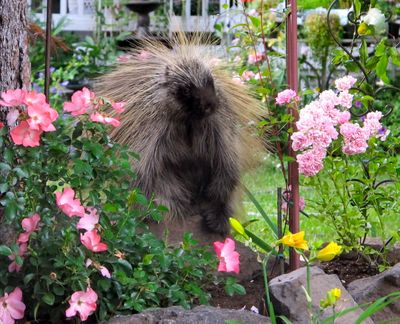Porcupine quiz taps sticky subject

OUTGUESS – The porcupine doesn’t get much press. Unless it’s eating the bark off one of your trees or adorning your dog’s nose with quills, you might never know that one is around.
The latest issue of Wildlife Express, an Idaho Fish and Game Department publication written especially for youth, has a fun story about the porky, providing some of the facts for this little quiz on the least-pettable member of the rodent family.
1. Newborn porcupines are called:
a. Pups
b. Kids
c. Porcupettes
2. Giving birth to a porcupine is possible because:
a. They’re born without quills, which grow out within a week
b. They’re born with soft quills that harden soon after birth
c. They’re born in an egg-like case that dissolves when exposed to air
3. An adult porcupine defends itself by:
a. Launching sharp quills like little rockets when attackers get close
b. Climbing a tree and dropping like a bomb to impale the attacker with quills
c. Sitting still, except for maybe a backward step and the swish of a tail, and letting attackers stick themselves with sharp quills that pull out easily from the porcupine but hook tenaciously to the attacker
4. A porcupine’s main predators are:
a. Fishers
b. Golden eagles
c. Bears
5. The Latin name for porcupine, Erethizon dorsatum, means:
a. Bark eater
b. Quill pig
c. Tree-climbing pin cushion
6. When a porcupine loses its quills in an attack it:
a. Dies, as a bee dies after losing its stinger
b. Doesn’t miss them because it has plenty more
c. Grows replacement quills
7. A group of porcupines is called a:
a. quiver
b. herd
c. prickle
Answers: 1, a and c. 2, b. 3, c. 4, a. 5, b. 6, c. 7, c.
Nymph fishing:
effective and legal
OUTCAST – Oregon fly fishing author Dave Hughes will present a free program, “Nymph Fishing Simplified,” Wednesday, 7 p.m., at St. Francis School, 104 W. Heroy, sponsored by the Spokane Fly Fishers.
Hughes, author of more than 20 books on fly fishing for trout, will cover selecting the right nymph, choosing the right way to rig it, and then using the proper presentation to fool the fish. His presentation is applicable to both still waters and streams.